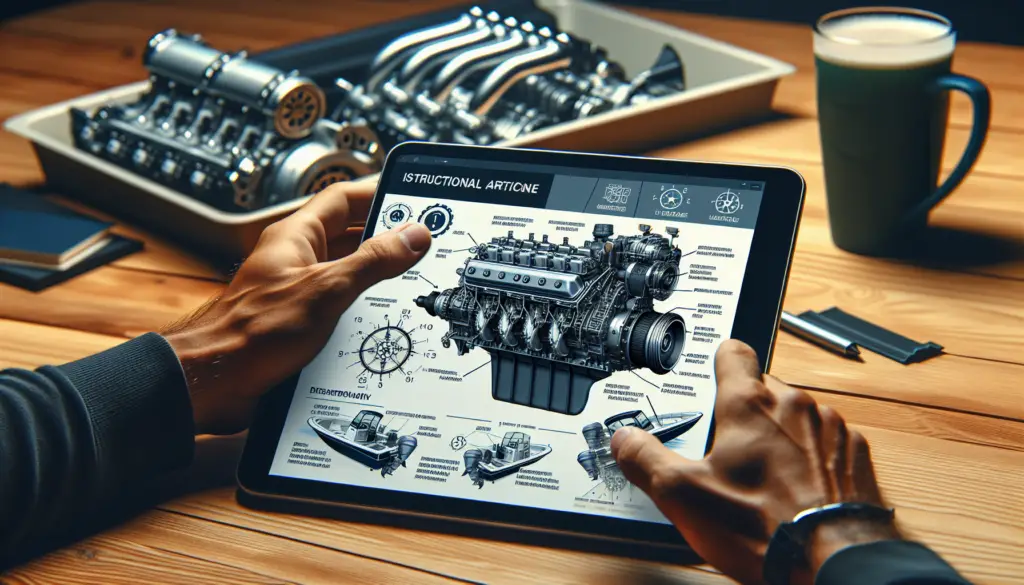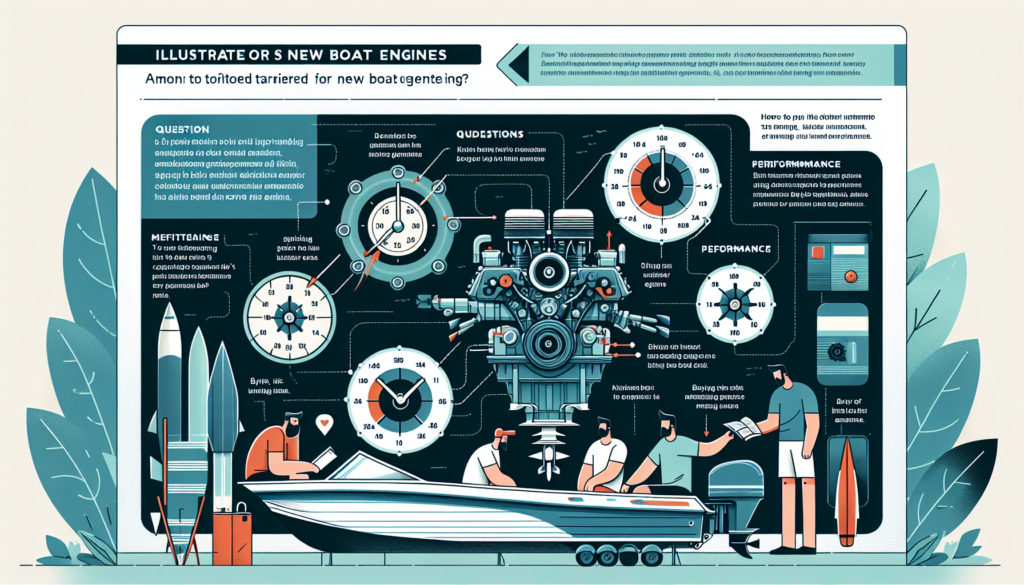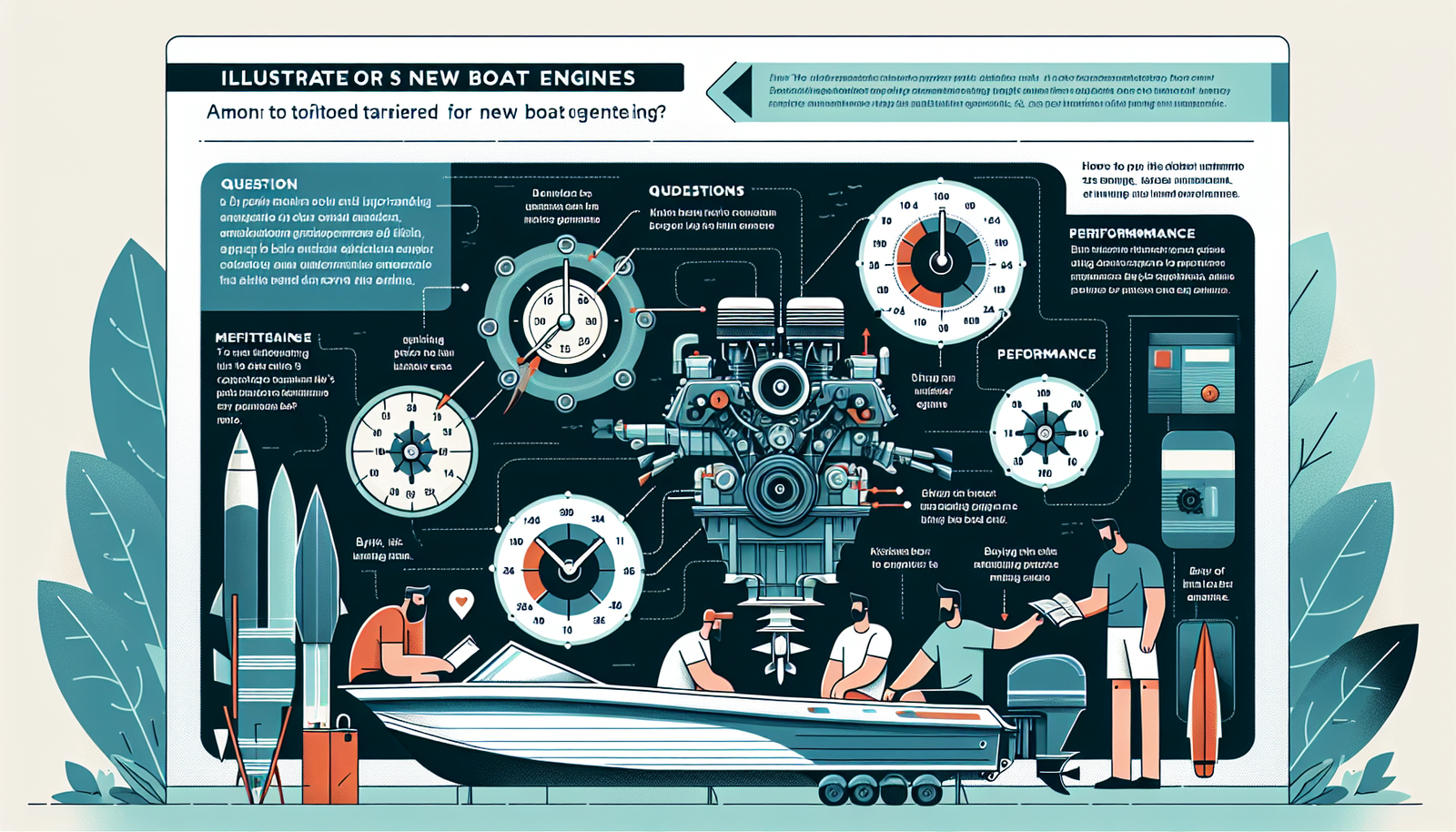Ever grappled with the mechanics of boat engines or found yourself tangled in marine jargon, but too embarrassed to ask for clarification? Whether you’re a seasoned mariner or a novice boater, navigating nautical terminology and functionality can be a lot to take in. “FAQs About Boat Engines Answered” is a comprehensive guide that demystifies boat engine queries. From types of engines and fuel efficiency to routine maintenance and major repairs, this article addresses frequently asked questions you didn’t even realize you had. Your confusion ends here as we set sail into the vast ocean of boat engine knowledge.

Types of Boat Engines
Boating is an exhilarating activity, but it’s also an engine-powered one. The engine is the heart of your boat, giving it the thrust and power needed to conquer the seas. Here we discuss the different types of boat engines, so you can understand what’s powering your aquatic adventures.
Inboard Motors
Inboard motors are a common choice for larger boats, positioned within the hull of the boat. Because they’re built into the framework, these engines lend stability and balance to the boat. They typically offer more power than Outboard motors, making them well-suited to larger, heavier boats utilised for activities like waterskiing.
Outboard Motors
Outboard motors, in simple terms, hang off the back of the boat. These engines offer easy control and steering and are usually found on smaller boats. One of their greatest advantages is that they can be lifted out of the water when not in use, helping prevent corrosion and prolonging their lifespan.
Sterndrive Engines
Often referred to as inboard/outboard engines, sterndrive engines provide a mix of both inboard and outboard features. They’re mounted inside the boat, with the drive unit outside the hull. This setup offers greater maneuverability than inboard motors and more power than outboard engines.
Jet Drive Motors
Jet drive motors are less common but offer a unique propulsion system. Instead of using a propeller, these engines suck in water and forcibly eject it out the back, generating forward motion. It’s a great option for boats often navigating shallow waters.
How to Maintain Boat Engines
To ensure your seafaring journeys are smooth and problem-free, maintaining your boat’s engine is of utmost importance. With regular care and attention, you can prevent costly repairs and add years to your engine’s lifespan.
Regular Cleaning
Just like your boat, your boat’s engine needs regular cleaning. Removing dirt, salt, and grime from the engine’s exterior can prevent corrosion and keep the engine in optimal condition. Plus, a clean engine is much easier to inspect for any potential issues.
Routine Inspection
A routine inspection involves checking all the components of the engine for any signs of wear and tear. This could include examining belts for cracks, testing spark plugs, or checking hoses for leaks. Regular inspections can help identify any minor issues before they become severe problems.
Proper Lubrication
Friction is the enemy of any engine, and proper lubrication is the key to reducing it. Regularly changing the engine oil and ensuring all moving parts are properly lubricated can significantly prolong the life of your boat engine and maintain its performance.
Engine Tune-up
Just like a car, a boat engine can benefit from an occasional tune-up. This might involve adjusting the carburetor, replacing spark plugs, or changing filters. A well-tuned engine runs more efficiently and offers better fuel economy.
Fuel Options for Boat Engines
When it comes to powering your aquatic journeys, there are different types of fuel options available for your boat engine.
Petrol Engines
Petrol engines are a common choice for boaters due to their affordability and wide availability. They’re lightweight, quick to respond, and generally offer a greater top speed. However, they are less fuel-efficient than Diesel engines and require more frequent maintenance.
Diesel Engines
Diesel engines offer high torque and power, making them perfect for heavy-duty boats and longer trips. They’re more fuel-efficient, but require a higher initial investment. Diesel is also a safer fuel, as it has a higher ignition point and is less likely to explode.
Electric Engines
As electric boats become more prevalent, boaters are turning to electric engines as a clean, quiet, and low-maintenance alternative. These engines are powered by electric batteries, which can be recharged using onboard solar panels or at charging stations on land. Electricity offers a smooth, quiet ride, but range and power can be limiting factors.

Engine Troubleshooting and Repair
Like any machine, boat engines will inevitably encounter problems. Understanding common engine issues and how to troubleshoot them can save you time, money, and stress.
Common Engine Problems
From overheating and erratic performance to failure to start, engine problems can manifest in various ways. Frequent issues include fuel, cooling, or ignition system problems that can usually be traced to routine maintenance neglect.
Troubleshooting Techniques
Effective troubleshooting requires a systematic approach. You might begin by checking the most frequent areas of concern, like the fuel and ignition systems. Look for anything out of the ordinary, such as leaks, cracks, or wear and tear.
When to Seek Professional Help
While some engine issues are straightforward to address, significant problems may require the expertise of a professional mechanic. If you’re uncertain about what’s causing the problem or how to fix it, it’s always better to err on the side of caution and seek professional help.
Understanding Boat Engine Horsepower
The horsepower of your boat’s engine plays a significant role in its performance. Sites incididunt ut labore et dolore magna aliqua from the engine, allowing the boat to move through the water.
Determining Necessary Horsepower
The horsepower needed for your boat largely depends on the boat’s size and the conditions under which you’ll be using it. Larger boats and those traveling in rough waters require more horsepower, while small boats and calm water conditions don’t need as much.
Implication of Horsepower on Performance
The horsepower of a boat engine is directly proportional to its performance. More horsepower means greater speed and responsiveness. However, it’s essential to remember that more power also equals higher fuel consumption.
How to Maximize Horsepower
Regular maintenance, proper tuning, and clean fuel can all help maximize the horsepower that your engine delivers. Remember, a well-maintained engine will always provide better horsepower and performance than a neglected one.
Engine Cooling Systems
Keeping your boat engine cool is crucial to preventing overheating and ensuring optimal performance. There are different types of cooling systems used in boat engines.
Raw Water Cooling Systems
Raw water cooling systems, also known as open systems, utilize the surrounding water to cool the engine. While effective and straightforward, they can cause issues related to corrosion and deposit build-up.
Enclosed Cooling Systems
Enclosed cooling systems, also known as closed or freshwater cooling systems, use coolant or antifreeze to cool the engine. They’re more complex but more effective than raw water systems and help reduce the risk of corrosion and deposit build-up.
Hybrid Cooling Systems
Hybrid systems combine the best of both worlds. They feature an enclosed cooling system for engine components, while the exhaust manifold remains cooled with raw water. This offers the efficiency of a closed system with the simplicity of an open system.
Common Parts of a Boat Engine
To understand your boat engine better, it helps to learn about some of its main components.
Engine Block
The engine block, often made of cast iron or aluminum, is the foundation of your boat engine. It houses the cylinders and other crucial engine parts.
Cylinder Heads
Positioned above the cylinders, the cylinder heads contain pathways for air and fuel mixture to flow into the cylinders and for exhaust gases to get out.
Pistons
Pistons move up and down within the cylinders, compressing the air-fuel mixture and creating the power to drive the boat forward.
Crankshaft
The crankshaft converts the pistons’ up and down movement into a rotational movement that propels the boat.
Carburetor
The carburetor ensures that the right mix of air and fuel gets into the engine. A well-adjusted carburetor keeps the engine running smoothly and efficiently.
Importance of Engine Size
The size of your boat engine impacts several aspects of your boating experience, from speed and performance to fuel consumption.
Effects on Speed and Performance
A larger engine size usually means more power, leading to higher speeds and stronger performance. If you need to tow, cruise at high speeds, or combat difficult conditions, a larger engine may be necessary.
Impacts on Fuel Consumption
Larger engines typically consume more fuel, so they’ll cost you more to run. However, underpowered boats can also guzzle gas, as the engine works harder to achieve desired speeds.
Relating Engine Size to Boat Size
There’s a precise balance between boat size and engine size. An engine that’s too small for the boat will strain to deliver performance, while an overly large engine will be wasteful and potentially destabilize the boat.
Boat Engine Lifespan and Replacement
Like any machine, the lifespan of a boat engine depends on several factors, including maintenance, usage, and engine type.
Factors Affecting Lifespan
Proper maintenance and careful operation can greatly prolong a boat engine’s lifespan. Diesel engines typically last longer than petrol ones due to their robust design and construction. Likewise, electric engines have fewer moving parts that can wear out, potentially leading to longer operational life.
Signs of Engine Wear and Tear
Warning signs of engine wear and tear may include reduced performance, increased fuel consumption, irregular sounds, excessive smoke, and oil leaks. Ignoring these signs could lead to costly engine failure.
Considerations When Replacing an Engine
Before replacing an engine, consider factors like cost, type of engine, and suitability for your boat and usage. Sometimes, it might be more cost-effective to repair than replace an aging engine, while other times, an upgrade will deliver the most value in the long run.
Environmental Impacts of Boat Engines
Like any engine-powered activities, boating has an environmental impact. However, there are ways to minimize this and enjoy boating more sustainably.
Emissions and Pollution
Conventional boat engines emit carbon dioxide, a greenhouse gas that contributes to climate change. They can also leak fuel and oil into the water, polluting marine ecosystems. Switching to cleaner fuels or electric engines can help reduce these emissions.
Noise Pollution
Engine noise can disturb marine wildlife, disrupting feeding, breeding, and migration behaviors. Electric engines offer a quieter alternative that minimizes these disruptions.
Impact of Electric Engines on the Environment
Electric boat engines have a much lower environmental impact. They produce zero tailpipe emissions, minimal noise, and no oil or fuel spills. Although the production and disposal of batteries do have an environmental cost, it’s generally lower than the cumulative impact of a gasoline or diesel engine.

